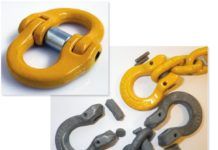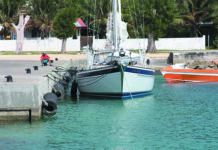In these times when everyone seems interested in tight tacking angles, a taut forestay is the ticket to ride.
And to create a taut forestay you need an equally hard-working backstay.
If youre a serious racer, the forestay-backstay combination is needed to bend the mast to change the mainsail shape. If youre a club racer or cruiser, its to take most of that awful sag out of the jibs luff.
To ease off the tension-when on other points of sailing or to make it easier to furl up the jib-you need a backstay whose length can be readily changed.
Further, one of the most important functions of any backstay adjuster is to ease the strain on the rig and boat when at anchor, when docked or when hauled-for repairs or for seasonal lay-up. Leaving a boat unnecessarily burdened with extreme tension in the standing rigging is like leaving the Kentucky Derby winner saddled for a week.
The quickest way to pump up or release the pressure in the triangles made by the backstay, the mast, the forestay and the boat is with a hydraulic pump. Theyre costly. Well deal with them in a subsequent report.
For now, weve assembled all the mechanical backstay adjusters we could find. All sizes. All shapes. Theyre not cheap, mostly because they must be strong and foolproof.
Included in the international collection are backstay contraptions from Dermac, Harken, Hasselfors, Johnson, R.D.M. Sparcraft, Spinlock and Wichard. (An English firm, Barton, and an Australian company, Ronstan, used to make backstay adjusters but have dropped out of the competition.)
These seven devices benefit from a single engineering approach. Each utilizes the immense power of simple threads cranked with a lever of some sort. What results is nothing more than a compact, circular version of the Egyptians inclined plane, which enabled them to build pyramids.
In alphabetical order, here are the choices.
Dermac
The French-made Dermac is a tapered chunk of polished stainless steel with T-toggled shackles at both ends.
It has two fold-up, arc-like handles made of black powder-coated aluminum. Tension on the handles is via nylon washers-not the best, but they can be tightened by taking up on the handles axles.
Because Dermac uses 10 threads per inch on the rod, it will extend or retract an inch quicker than, for instance, will the Harken, which has more threads. However, the load will be heavier.
The stainless threaded rod comes out of the body covered with black grease, which is unsightly and could collect dirt, carrying it back inside. Worse, perhaps, someone who leans against it or grabs for a handhold would not be pleased.
The welds attaching the T-toggles to the stainless body are neither artistic nor as mechanically well done as they could be. However, someone thought to drill a drain hole in the bottle toggle.
The shackles are made of stainless plate rather than forged and the finish on the shackles is poor. The ends of the clevis pins are quite rough, a far cry from the fine surface finishing and polishing of Wichard. (A good mirror finish on stainless is not just cosmetic; its a vital part of the anti-corrosion protection.)
There are three entirely different sizes of Dermacs. The one for 7/16″ clevis pins lists for $450. The 1/2″ is $490. The 5/8″ is $725. The prices are list and should be about a third less at discount if ordered through West Marine or Boat/U.S.
Harken
As with virtually all Harken gear, the Harken backstay adjuster is a quality piece of work.
Made in Italy by Barbarossa (which Harken owns), it comes in four sizes (pin sizes from 1/2″ to 3/4″) and standard strokes from 5-1/2″ to 8-11/16″, with custom lengths available in the two larger models.
The 7/16″ and 1/2″ pin models have fold-down handles. Because of the fine threads, youll be turning these handles about 20 times per inch of linear adjustment. Thats a lot of turning. The handles stay folded down and store in the up position with good springs that eliminate any annoying rattles.
The larger ones operate with a standard winch handle, which is much more convenient if you have the room to swing the handle.
The Harkens have O-rings at the top to keep water out of the sealed worm tube. The rod that extends is clean.
Made largely of solid stainless and chromed bronze-with bronze worm gears, bronze thread drives and greased bearings on moving parts-the Harkens are heavy equipment. They range in weight from nearly 4 pounds to more than 8 pounds.
Breaking strength? Forget it. Youll never break one of these.
Considering the perfectionist (and massive) approach, the Harkens are not badly priced, considering that they discount about 30% to $650 to about $1,600.
Hasselfors
Made in Sweden, the Hasselfors backstay adjuster comes in one model, two sizes-one with almost a 10″ throw, the other with 15-3/4″.
Both sizes, made for 13 mm clevis pins, have a breaking strength of 14,333 pounds.
Both are adjusted with a standard winch handle powering a worm gear. The driven gear is bronze, the driver is stainless with needle bearings.
Because the worm has seven turns per inch, and is cranked with a continuous-motion winch handle, the Hasselfors is the second quickest to retract or extend.
The entire mechanism, along with the threaded rod, is nicely encased in anodized aluminum tubing regularly used by Hasselfors to cover turnbuckles. Plastic caps keep the aluminum from touching the stainless.
Although somewhat semi-custom, the Hasselfors adjusters are not very expensive. The large model, which has the greatest throw of any stock backstay adjuster, lists for $630
Johnson
If Harken is elegance, C. Sherman Johnson is working man tough.
The Connecticut company buys good stainless steel, uses the steel wisely with what-you-see-is-what-you-get engineering and doesn’t have to build into its budget much, if any, money for warranty work.
Johnson backstay adjusters, for pin sizes ranging from 1/4″ to 5/8″, are basically turnbuckles (for which Johnson is noted) with locking handles. They have T-toggles and heavy shackles at both ends. The bronze toggle heads are threaded on 5/8″ bronze rods to prevent any galling.
The adjuster is operated with stainless steel fold-out handles that are stamped and bent in a C section. The C shape engages a large stainless nut on the top of the barrel to lock the turnbuckles in a simple, foolproof manner.
The handles work surprisingly well and, with 18 threads per inch on the larger models, the adjuster is on a par for power with Harken.
Because of the thrifty engineering, the powerful Johnson adjusters are relatively light in weight, which along with their reasonable cost adds to their allure.
For comparison, a Harken adjuster for 3/8″ wire, a 5/8″ pin and a breaking strength of 16,755 pounds weighs nearly 10 pounds. It has a stroke of 7″. It costs more than $1,000.
A Johnson of similar specifications weighs 3 pounds, 12 ounces and costs $220. The Johnsons downside: The stroke is 6″ and it doesn’t shine.
R.D.M. Sparcraft
Imported from France by Charleston Spars in Charlotte, North Carolina, the R.D.M. adjusters are meant for either backstays or inner forestays. For the latter, a Wichard shackle replaces the standard jaws.
The R.D.M. adjusters have stainless bodies, toggles and worm screws. The worm drive is about 6-1/2 threads per inch, making this the fastest drive unit of all. For quick adjustments, thats good. However, it also means that it will be much more difficult to crank in the upper levels of tension.
The nut body (the housing that advances or retracts the worm) is made of bronze, which is cotter-pinned to a black-anodized aluminum ring to which the fold-down arms (spring-loaded when stored) are attached. The aluminum ring is so indifferently made that one cranking arm comes down perpendicular to the shaft, but the other stops about 10 or 12 short of perpendicular.
On the model examined, the not-very-smooth weld affixing the toggle to the worm screw already was showing the telltale brown color of what appears to be corrosion.
The R.D.M. adjusters come in two sizes-for 3/8″ and 1/2″ pins.
They list for $310 to $514.
Spinlock
The little Spinlock backstay adjuster in our collection is from a small British firm known for its hiking sticks and line-handling hardware (including a new and very unusual rope clutch that we will be examining in a few weeks).
The Spinlock adjusters, intended for boats in classes like the J/24, Melges 24 and Etchells, are two-handle devices like the Johnson discussed above. Theyre meant for all stays and shrouds, not just backstays. They have about a 3″ throw but the 22-per-inch threads mean youll be turning 22 times to take up or ease an inch.
Among the refinements on the Spinlocks are numbers (from 0 to 65 mm) laser-etched on the machined stainless barrel to permit repeatable changes (as on Ronstans Sealoc turnbuckles, which also can be fitted with a wrench-like handle).
A unique Spinlock touch is the articulated jaw base to take up any misalignment or sag. It makes a toggle unnecessary. The take-up collar is bronze, as it should be, to avoid the galling that can occur when the threads on both the stud and barrel are stainless.
Spinlock very properly is quick to advise that when used on backstays, care should be taken as these turnbuckles have no end stop.
The Spinlocks currently come in three sizes-for 4 mm, 5 mm wire and 3/16″ wire, to which it is intended that the adjusters be swaged.
With the marked calibrations and the locking handle, the Spinlocks would be great to have on all stays and shrouds of any small boat when its time to step and tune the mast. Great except that they cost $150 a shot vs. about $20 or $30 for a standard jaw-swage turnbuckle. For a boat with uppers and lowers, the total cost would be about $900 worth of Spinlocks instead of $150 for standard turnbuckles.
Wichard
Widely known for its shackles, Wichard makes two basic adjusters.
One version, for 1/4″, 9/32″ and 5/16″ wire, is available with either a wheel adjuster or a single fold-up lever. A larger version with a ratcheting handle, for up to 3/8″ wire, comes in two lengths. Except for the very , which takes a 5/8″ pin, all take 1/2″ pins, which seems like a good idea.
The wheelie version is popular and discounts for about $316. It has a 6-1/4″ black-anodized wheel turning against a bronze collar to adjust the stainless threaded rod and even an arrow to tell the operator which is the tensioning direction. The handle version, which you use as a wrench, slipping it on and off the turning nut, has a rubber grip and stows in a rubber clamp.
Both have T-toggles beautifully welded on the stainless rod and excellent shackles.
On each model, the stainless barrel has a cut-out slot with stamped numbers, ranging from 0 to 160 mm, and a handy red indicator button. Its very well done.
The large Wichards have good throws-17-5/16″ x 26″ and 19-7/8″ x 29-3/4″-and have excellent switchable ratchet mechanisms that, along with a 12-to-the-inch threaded rod, make them the easiest of all to adjust.
The Wichards, with breaking strengths right up to or slightly exceeding the equivalent Harken and Johnson counterparts, discount to $1,160 for the large model and $620 for the smaller version.
Bottom Line
The word contraptions was used early on in this report to describe these devices. Thats unfair, if the word has for you a negative connotation. All of these devices are well made, as they must be. A backstay and all parts thereto must not fail.
With the Spinlocks in a separate category, our view of the larger backstay adjusters has to do with ease of operation, weight and finish and appearance.
For ease of operation, the winch-handled Harkens and quick-adjusting Hasselfors are excellent, but our choice would be the single-lever, ratchet-model Wichard, followed by the two-handled Harken.
For light weight, the Johnson is the clear standout.
For finish and appearance, wed rank them Harken, Wichard and Dermac.
Best overall are the smooth-operating Harkens, but theyre heavy-both in weight and in price.
Firm holder of the weight/price middle ground is Wichard, which makes good gear-especially the single-handle ratchet models.
The Best Buy by a mile and a quarter is the two-handle Johnson.
Contacts- Dermac, Marinox, 401 NE 8th St., Fort Lauderdale, FL 33304. 800/379-3330. Harken, 1251 E. Wisconsin Ave., Pewaukee, WI 53072. 414/691-3320. Hasselfors, Selden Mast, Inc., 4668 Franchise St., N. Charleston, SC 29418. 800/571-0440. Johnson, C. Sherman Johnson Co., Inc., Industrial Park, East Haddam, CT 06423. 860/873-8697. R.D.M. Sparcraft, Charleston Spar, 3901 Pine Grove Circle, Charlotte, NC 28206. 704/597-1502. Spinlock, Maritime Supply LLC, 42 Grandview Terrace, Essex, CT 06426. 860/767-0468. Wichard, 507 Hopmeadow St., Simsbury, CT 06070. 860/651-8406.




































